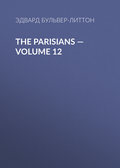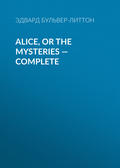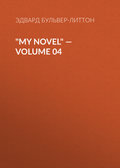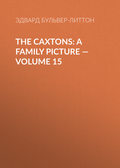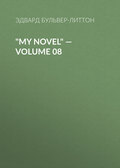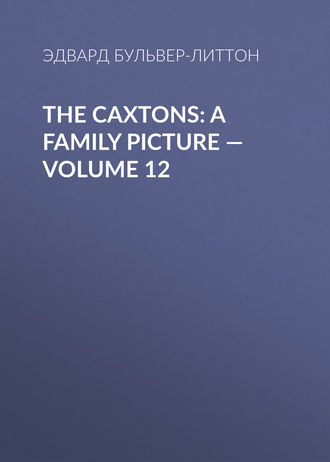
Эдвард Бульвер-Литтон
The Caxtons: A Family Picture — Volume 12
PART XII
CHAPTER I
The Hegira is completed,—we have all taken roost in the old Tower. My father's books have arrived by the wagon, and have settled themselves quietly in their new abode,—filling up the apartment dedicated to their owner, including the bed chamber and two lobbies. The duck also has arrived, under wing of Mrs. Primmins, and has reconciled herself to the old stewpond, by the side of which my father has found a walk that compensates for the peach-wall, especially as he has made acquaintance with sundry respectable carps, who permit him to feed them after he has fed the duck,—a privilege of which (since, if any one else approaches, the carps are off in an instant) my father is naturally vain. All privileges are valuable in proportion to the exclusiveness of their enjoyment.
Now, from the moment the first carp had eaten the bread my father threw to it, Mr. Caxton had mentally resolved that a race so confiding should never be sacrificed to Ceres and Primmins. But all the fishes on my uncle's property were under the special care of that Proteus Bolt; and Bolt was not a man likely to suffer the carps to earn their bread without contributing their full share to the wants of the community. But, like master, like man! Bolt was an aristocrat fit to be hung a la lanterne. He out-Rolanded Roland in the respect he entertained for sounding names and old families; and by that bait my father caught him with such skill that you might see that if Austin Caxton had been an angler of fishes, he could have filled his basket full any day, shine or rain.
"You observe, Bolt," said my father, beginning artfully, "that those fishes, dull as you may think them; are creatures capable of a syllogism; and if they saw that, in proportion to their civility to me, they were depopulated by you, they would put two and two together, and renounce my acquaintance."
"Is that what you call being silly Jems, sir?" said Bolt. "Faith! there is many a good Christian not half so wise."
"Man," answered my father, thoughtfully, "is an animal less syllogistical or more silly-Jemical, than many creatures popularly esteemed his inferiors. Yes, let but one of those Cyprinidae, with his fine sense of logic, see that if his fellow-fishes eat bread, they, are suddenly jerked out of their element and vanish forever, and though you broke a quartern loaf into crumbs, he would snap his tail at you with enlightened contempt. If," said my father, soliloquizing, "I had been as syllogistic as those scaly logicians, I should never have swallowed that hook which—Hum! there—least said soonest mended. But, Mr. Bolt, to return to the Cyprinidae."
"What's the hard name you call them 'ere carp, yer honor?" asked Bolt.
"Cyprinidae,—a family of the section Malacoptergii Abdominales," replied Mr. Caxton; "their teeth are generally confined to the Pharyngeans, and their branehiostegous rays are but few,—marks of distinction from fishes vulgar and voracious."
"Sir," said Bolt, glancing to the stewpond, "if I had known they had been a family of such importance, I am sure I should have treated them with more respect."
"They are a very old family, Bolt, and have been settled in England since the fourteenth century. A younger branch of the family has established itself in a pond in the gardens of Peterhoff (the celebrated palace of Peter the Great, Bolt,—an emperor highly respected by my brother, for he killed a great many people very gloriously in battle, besides those whom he sabred for his own private amusement); and there is an officer or servant of the Imperial household, whose task it is to summon those Russian Cyprinidae to dinner, by ringing a bell, shortly after which, you may see the emperor and empress, with all their waiting ladies and gentlemen, coming down in their carriages to see the Cyprinidae eat in state. So you perceive, Bolt, that it would be a republican, Jacobinical proceeding to stew members of a family so intimately associated with royalty."
"Dear me, sir," said Bolt, "I am very glad you told me. I ought to have known they were genteel fish, they are so mighty shy,—as all your real quality are."
My father smiled, and rubbed his hands gently,—he had carried his point; and henceforth the Cyprinidae of the section Malacoptergii Abdominales were as sacred in Bolt's eyes as cats and ichneumons were in those of a priest in Thebes.
My poor father, with what true and unostentatious philosophy thou didst accommodate thyself to the greatest change thy quiet, harmless life had known since it had passed out of the brief, burning cycle of the passions! Lost was the home endeared to thee by so many noiseless victories of the mind, so many mute histories of the heart; for only the scholar knoweth how deep a charm lies in monotony, in the old associations, the old ways and habitual clockwork of peaceful time. Yet the home may be replaced,—thy heart built its home round itself everywhere,—and the old Tower might supply the loss of the brick house, and the walk by the stewpond become as dear as the haunts by the sunny peach-wall. But what shall replace to thee the bright dream of thine innocent ambition,—that angel-wing which had glittered across thy manhood, in the hour between its noon and its setting What replace to thee the Magnum Opus—the Great Book!—fair and broad-spreading tree, lone amidst the sameness of the landscape, now plucked up by the roots? The oxygen was subtracted from the air of thy life. For be it known to you, O my compassionate readers, that with the death of the Anti- Publisher Society the blood-streams of the Great Book stood still, its pulse was arrested, its full heart beat no more. Three thousand copies of the first seven sheets in quarto, with sundry unfinished plates, anatomical, architectural, and graphic, depicting various developments of the human skull (that temple of Human Error), from the Hottentot to the Greek; sketches of ancient buildings, Cyclopean and Pelasgic; Pyramids and Pur-tors, all signs of races whose handwriting was on their walls; landscapes to display the influence of Nature upon the customs, creeds, and philosophy of men,—here showing how the broad Chaldean wastes led to the contemplation of the stars; and illustrations of the Zodiac, in elucidation of the mysteries of symbol-worship; fantastic vagaries of earth fresh from the Deluge, tending to impress on early superstition the awful sense of the rude powers of Nature; views of the rocky defiles of Laconia,—Sparta, neighbored by the "silent Amyclae," explaining, as it were, geographically the iron customs of the warrior colony (arch-Tories, amidst the shift and roar of Hellenic democracies), contrasted by the seas and coasts and creeks of Athens and Ionia, tempting to adventure, commerce, and change. Yea, my father, in his suggestions to the artist of those few imperfect plates, had thrown as much light on the infancy of earth and its tribes as by the "shining words" that flowed from his calm, starry knowledge! Plates and copies, all rested now in peace and dust, "housed with darkness and with death," on the sepulchral shelves of the lobby to which they were consigned,— rays intercepted, world incompleted. The Prometheus was bound, and the fire he had stolen from heaven lay imbedded in the flints of his rock. For so costly was the mould in which Uncle Jack and the Anti-Publisher Society had contrived to cast this exposition of Human Error that every bookseller shied at its very sight, as an owl blinks at daylight, or human error at truth. In vain Squills and I, before we left London, had carried a gigantic specimen of the Magnum Opus into the back parlors of firms the most opulent and adventurous. Publisher after publisher started, as if we had held a blunderbuss to his ear. All Paternoster Row uttered a "Lord deliver us!" Human Error found no man so egregiously its victim as to complete those two quartos, with the prospect of two others, at his own expense. Now, I had earnestly hoped that my father, for the sake of mankind, would be persuaded to risk some portion—and that, I own, not a small one—of his remaining capital on the conclusion of an undertaking so elaborately begun. But there my father was obdurate. No big words about mankind, and the advantage to unborn generations, could stir him an inch. "Stuff!" said Mr. Caxton, peevishly. "A man's duties to mankind and posterity begin with his own son; and having wasted half your patrimony, I will not take another huge slice out of the poor remainder to gratify my vanity, for that is the plain truth of it. Man must atone for sin by expiation. By the book I have sinned, and the book must expiate it. Pile the sheets up in the lobby, so that at least one man may be wiser and humbler by the sight of Human Error every time he walks by so stupendous a monument of it."
Verily, I know not how my father could bear to look at those dumb fragments of himself,—strata of the Caxtonian conformation lying layer upon layer, as if packed up and disposed for the inquisitive genius of some moral Murchison or Mantell. But for my part, I never glanced at their repose in the dark lobby without thinking, "Courage, Pisistratus! courage! There's something worth living for; work hard, grow rich, and the Great Book shall come out at last!"
Meanwhile, I wandered over the country and made acquaintance with the farmers and with Trevanion's steward,—an able man and a great agriculturist,—and I learned from them a better notion of the nature of my uncle's domains. Those domains covered an immense acreage, which, save a small farm, was of no value at present. But land of the same sort had been lately redeemed by a simple kind of draining, now well known in Cumberland; and, with capital, Roland's barren moors might become a noble property. But capital, where was that to come from? Nature gives us all, except the means to turn her into marketable account. As old Plautus saith so wittily, "Day, night, water, sun, and moon, are to be had gratis; for everything else—down with your dust!"



